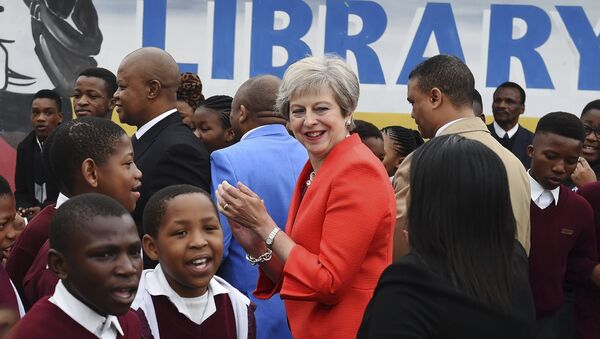Ms. Mordaunt plans to allow pension funds and other for-profit groups to invest money in overseas projects, Politics Home reported, and announced her plans in a speech on Tuesday.
Ms. Mordaunt said in her speech at the CDC in London, a global investment firm for Asian and African businesses, that the UK was in a crucial stage of Brexit negotiations and the government needed to determine how to "close the resource gap to deliver the UN Global Goals" while making Britain and "its citizens stronger and more financially secure."
Calling the synergy between the private and public sector "compassion and capital", she added that the UK was "one of the most generous countries in the world" and stood by her nation's ideological pillars of "international cooperation, free trade, democracy, capitalism, international humanitarian law, property rights, scientific and medical discovery, and freedom."
READ MORE: TPP Represents Very Interesting Opportunity for UK Post-Brexit — Scholar
Mordaunt also stated that UK would "continue to support development and stability" in the EU and other places such as the Western Balkans, Ukraine, refugee camps in Turkey and Greece, as well as North Africa and Libya, in addition to contributing £1.5 billion each year to the EU's development agenda.
"How we do aid is changing," a source close to Ms. Mordaunt told Politics Home. "It's now much more about projects that help a country's economy, which means there is an opportunity for private money to make a return."
The source added that "Penny believes that means when investors step in, the taxpayer can step back, freeing up billions to spend elsewhere in government."
A CDC Global spokesperson told Sputnik that CDC defines official development assistance (ODA) as "a Government decision negotiated with other governments at the OECD" while adding it focuses on delivering "development impact from our investments in the countries where we operate."
However, others have slammed Mordaunt's foreign aid privatization scheme, calling it a "betrayal" of the country's responsibility.
"Penny Mordaunt's announcement this morning sets the stage for the full-scale privatisation of aid spending," Ed Lewis, aid policy manager at Global Justice Now said in a press statement.
READ MORE: UK Gets Warm Welcome in Asia After Facing Cold Shoulder in Brexit Talks With EU
Lewis mentioned that the government plans to "outsource its obligations to tackle poverty to the private sector", adding that the move was a "betrayal of our country's responsibility for ending global poverty and inequality, and instead turns other people's poverty into a money-making opportunity."
He continued that Mordaunt's plans were based on a "delusional view of Britain's historic role in the world" where British businesses are "only ever a force for good". He also condemned her for only focusing on trade and ignoring Britain's imperial history, which contributed to the rise of inequality.
"The gains of anti-poverty campaigning over the last thirty years to put people before profit are under threat if this wrong-headed privatisation of the aid budget is allowed to proceed," he said.
Despite condemnation, the government has changed its global assistance program, which is inextricably linked to the government's desire to placate the UK's private sector as it moves forward with post-Brexit plans.
UK Developmental Aid-A Breakdown
The Department for International Development breaks down ODA (foreign aid) into bilateral and multilateral expenditures expenses.
Governments have control over bilateral ODA "going to specific countries, regions or programmes" while multilateral ODA is "pooled with other donors' funding" as part of a multilateral organization and will "fluctuate from year to year" due to payment schedules, a 2018 report states.
The Department for Interational Development (DFID) has committed to spending 0.7 percent of Britain's GDP on aid projects as determined by UN and OECD figures.
DFID report notes that the UK has spent £8.7 billion in bilateral ODA in 2017, up £164 million pounds since 2016. 10.1 percent (£1.4 billion) was used for 'humanitarian assistance', mostly attributed to the East African drought and Yemen conflict, up £123 million from 2016.
READ MORE: UK Businesses Start Suffering From Uncertainty Over Brexit Outcome — Surveys
However, Britain spent £5.2 billion on multilateral institutions, up £391 from 2016 and representing 37.6 of total multilateral ODA. Contributions to the International Monetary Fund (IMF) Poverty Reduction and Growth Trust (IMF-PRGT) and World Bank accounted for an 8.1 percent increase in multilateral ODA, as opposed to a 1.9 percent increase in bilateral ODA.
The DFID shares foreign aid contributions with other governmental departments, with non-DFID departments increasingly taking over more shares of foreign aid as stated in its 2018 Aid Strategy, which plans to focus more on cybersecurity and growth in the private sector for developing nations.
The DFID stated that in order to "respond to the changing world, more aid will be administered by other government departments, drawing on their complementary skills." Transferring bilateral ODA to the private sector reduces the UK's budgetary constraints imposed by multilateral ones.
In an August 28 speech delivered in Cape Town, UK prime minister Theresa May prioritized tackling "malign state activity" ranging "from [cyberattacks] on national infrastructure and institutions, to the use of chemical weapons on the streets of the UK and Syria."
She also stated that her primary developmental goal was for "the UK to be the G7's number one investor in Africa" by 2022, "with Britain's private sector companies taking the lead in investing the billions that will see African economies growing by trillions."
Assuming that Mrs. May wishes to fulfil this strategy as part of her post-Brexit development goals, the UK governmet has chosen to work with the British private sector for two reasons: (1) to convince investors take a larger share of bilateral ODA and (2) merge her post-Brexit development strategy in developing countries with the private sector, who stands to make immense profits in the emerging economies.




